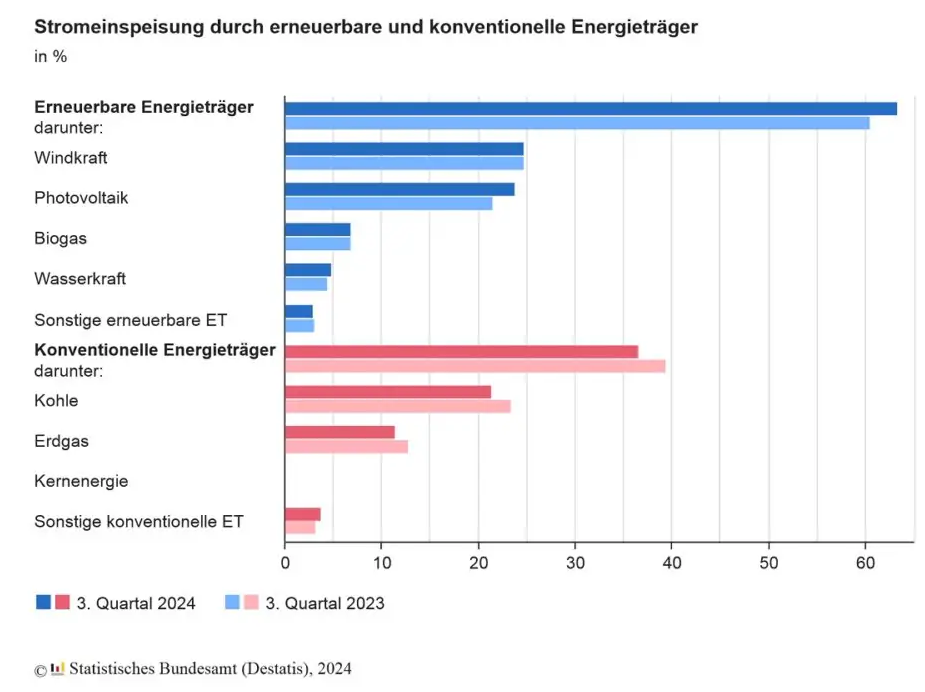
Inquiry
A Major Leap in Solar Power Generation: Q3, 2024 Review
In the third quarter of 2024, Germany's power generation plants produced 96.3 billion kilowatt hours of electricity, showcasing a surge of 2.5% from the same quarter in the prior year (94.0 billion kilowatt hours). The German Federal Statistical Office, Destatis, has revealed these preliminary results. A striking growth was observed in renewable power production, particularly wind and solar energy, with an increase of 7.1% in Q3, 2024.
Renewables held the record for the highest quarterly contribution, generating 63.4% of the total electricity produced. This was a significant hike from the 60.6% share recorded in Q3, 2023. Simultaneously, conventional energy resources saw a tumble of 4.7% in Q3, 2024 compared to the previous year, producing just 36.6% of domestically generated power (down from 39.4% in Q3, 2023).
The Solar Surge: A 13.5% Hike in Photovoltaic Power Generation
There was a noticeable increment in the generation of wind power in Q3, 2024, charting a growth of 2.4% from the previous year's Q3. Despite this, wind energy was still the biggest contributor to domestic power production, delivering 24.7% of the total electricity.
However, the most considerable increase was witnessed in solar power generation. With a surge of 13.5% from Q3, 2023, to Q3, 2024, the share of solar PV in the country's power supply became the second most significant, making up 23.8% of the power mix. In contrast, solar energy's contribution had stood at just 21.5% in the same quarter of the previous year.
The rise in power production from solar and wind energy can be ascribed to an increase in the installation of solar PV systems and exceptional sun and wind resources in Q3, 2024. As an illustration, the installed PV power was 20.5% higher at the start of Q3, 2024, than the same period in the preceding year.
Coal Reduced to the Third Most Important Energy Source
Compared to Q3, 2023, coal-based power generation dwindled by 6.0% in Q3, 2024. As a result, only 21.4% of the total power generated came from coal, reclassifying it as the third most crucial energy source. The production of electricity from natural gas also contracted by 8.8%, delivering just 11.4% of domestic power production (down from 12.8% in Q3, 2023).
Germany Records an Import Surplus of 11.8 Billion Kilowatt-hours
Further, the quantity of electricity imported into Germany in Q3, 2024, rose by 2.2% from Q3, 2023, reaching 23.6 billion kilowatt hours. This period also witnessed a marked growth in power exports, which advanced by 19.2%, from 9.9 billion to 11.8 billion kilowatt hours. Thus, Germany imported twice the amount of electricity it exported.
Interestingly, the import surplus shrank from 13.3 billion kilowatt hours in Q3, 2023, to 11.8 billion kilowatt hours in Q3, 2024.
For the period of January to September, the German Association of Energy and Water Industries (BDEW) reported that 59% of gross electricity production came from renewable sources. During the same timeframe, renewables contributed more than 20% to Germany's total energy need.
Maximizing Solar Potential with ACE Battery's Energy Storage Solutions
As Germany continues to increase its reliance on solar energy, integrating efficient energy storage systems becomes essential. ACE Battery offers advanced solar power energy storage solutions, allowing homeowners to store excess solar power for later use. Additionally, ACE Battery’s commercial solar power battery storage systems support businesses and municipalities in optimizing their solar energy use, reducing grid dependence, and ensuring energy reliability. These storage solutions play a vital role in enhancing the sustainability and efficiency of solar power, supporting the ongoing renewable energy transition in Germany and beyond.
Our expert will reach you out if you have any questions!

